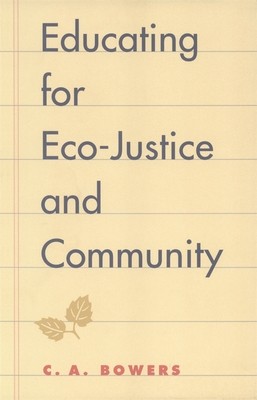
- We will send in 10–14 business days.
- Author: C a Bowers
- Publisher: University of Georgia Press
- ISBN-10: 0820323063
- ISBN-13: 9780820323060
- Format: 14.3 x 21.5 x 1.7 cm, minkšti viršeliai
- Language: English
- SAVE -10% with code: EXTRA
Reviews
Description
We believe in social justice. We support educational reform. Yet unless we reframe our approaches to both, says C. A. Bowers, the social justice attained through educational reform will only lead to more intractable forms of consumerism and further impoverishment of our communities. In Educating for Eco-Justice and Community Bowers outlines a strategy for educational reform that confronts the rapid degradation of our ecosystems by renewing the face-to-face, intergenerational traditions that can serve as alternatives to our hyper-consumerist, technology-driven worldview.
Bowers explains how current technological and progressive programs of educational reform operate on deep cultural assumptions that came out of the Enlightenment and led to the Industrial Revolution. These beliefs frame our relationship with nature in adversarial terms, view progress as inevitable, and elevate the individual over community, expertise over intergenerational knowledge, and profit over reciprocity. By making eco-justice a priority of educational reform, we can begin to: democratize developments in science and technology in ways that eliminate eco-racism;reverse the global processes that are worsening the economic and political inequities between the hemispheres;expose the cultural forces that turn aspects of daily life--from education and entertainment to work and leisure--into market-dependent relationships;uplift knowledge and traditions of intergenerationally connected communities; anddevelop a sense of moral responsibility for the long-term consequences of our excessive material demands. In the tradition of Wendell Berry, David Orr, and Kirkpatrick Sale, Bowers thinks about our place in the natural world and the current economies to show how we can reform education and create a less consumer-driven society.EXTRA 10 % discount with code: EXTRA
The promotion ends in 22d.23:50:30
The discount code is valid when purchasing from 10 €. Discounts do not stack.
- Author: C a Bowers
- Publisher: University of Georgia Press
- ISBN-10: 0820323063
- ISBN-13: 9780820323060
- Format: 14.3 x 21.5 x 1.7 cm, minkšti viršeliai
- Language: English English
We believe in social justice. We support educational reform. Yet unless we reframe our approaches to both, says C. A. Bowers, the social justice attained through educational reform will only lead to more intractable forms of consumerism and further impoverishment of our communities. In Educating for Eco-Justice and Community Bowers outlines a strategy for educational reform that confronts the rapid degradation of our ecosystems by renewing the face-to-face, intergenerational traditions that can serve as alternatives to our hyper-consumerist, technology-driven worldview.
Bowers explains how current technological and progressive programs of educational reform operate on deep cultural assumptions that came out of the Enlightenment and led to the Industrial Revolution. These beliefs frame our relationship with nature in adversarial terms, view progress as inevitable, and elevate the individual over community, expertise over intergenerational knowledge, and profit over reciprocity. By making eco-justice a priority of educational reform, we can begin to: democratize developments in science and technology in ways that eliminate eco-racism;reverse the global processes that are worsening the economic and political inequities between the hemispheres;expose the cultural forces that turn aspects of daily life--from education and entertainment to work and leisure--into market-dependent relationships;uplift knowledge and traditions of intergenerationally connected communities; anddevelop a sense of moral responsibility for the long-term consequences of our excessive material demands. In the tradition of Wendell Berry, David Orr, and Kirkpatrick Sale, Bowers thinks about our place in the natural world and the current economies to show how we can reform education and create a less consumer-driven society.

Reviews